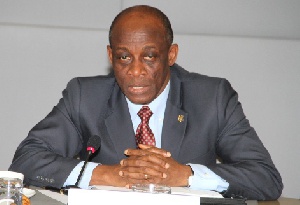 Mr Seth Terkper, Minister of Finance
Mr Seth Terkper, Minister of Finance
After issuing a US$1billion Eurobond at a coupon rate of 10.75 percent this month, Finance Minister Seth Terkper has confirmed that government will issue another US$500million when ‘conditions’ in the market become favourable.
After attributing the recent yields government accepted on the 15-year bond to unfavourable market conditions, the Minister told journalists last Friday that, having been given Parliamentary approval to raise US$1.5billion from the Eurobond market, it would go back to the market by close of year if conditions are right.
“I think it should be clear that we did not issue the entire US$500million additional because of market conditions – the same conditions for which it becomes contentious whether we should have borrowed at the 10.75 percent. If you took US$1.5billion because it was oversubscribed, the interest rate could have been higher. Therefore there was a judicious decision.’
“But we still have an approval from Parliament for US$1.5billion for 2015, so if the opportunity presents itself, since we have the advisors, before the end of the year and since it is part of the budget that was approved, we could still go to the market to borrow if the conditions are right,” he said.
Indeed the International Monetary Fund (IMF) just like many other analyst had expressed worry about the yields on the latest Eurobond which was third time in as many years the country was borrowing from the market to finance its yawning deficit.
The 15-year maturity was the longest ever achieved by a sub-Saharan African country outside of South Africa, but the issue also had the distinction of offering the highest yield ever by a sovereign borrowing from the region, notwithstanding a partial guarantee from the World Bank.
The fund last week told B&FT that ensuring that the country’s debt is sustainable is a critical component of Ghana’s IMF-supported programme, which also includes a debt management strategy that has been designed to ensure risks associated rollover are minimised.
“Unfortunately, current market conditions have pushed borrowing costs higher,” an IMF Spokesperson said.
But Mr. Terkper told journalists in his Ministry’s first ever meeting with the press after the Eurobond issuance that the bond remained central to the government’s debt sustainability plans.
Contrary to expectations that part of the Eurobond cash will be devoted to infrastructural projects as well as refinance maturing short-term domestic debts, Mr. Terkper said the funds will go directly to refinance maturing domestic debts.
He said government is shying away from borrowing from the short-term domestic money market to finance its capital projects. As part of government’s debt management strategy, it will be looking at long-term finance for its infrastructural projects, Mr. Terkper said.
Mr. Terkper talked about government’s preference for the Eurobond market but he said with difficult conditions in the market, other long-term sources of funding will be secured.
“If the markets are not favourable, you look for alternative sources. The government’s debt management policy includes using long-term finance which can be a loan from AfDB, World Bank etc to finance capital expenditure and that is a policy that is going to remain,” he added.
Touching on the rising public debt, Mr. Terkper said that the current total debt stock includes loans borrowed for some state-owned enterprises that have the ability to pay for their debts. He said loans for the Ghana Gas infrastructure among others have the potential of repaying for themselves and going forward SOEs that borrow will not do so on the books of government but on their books.